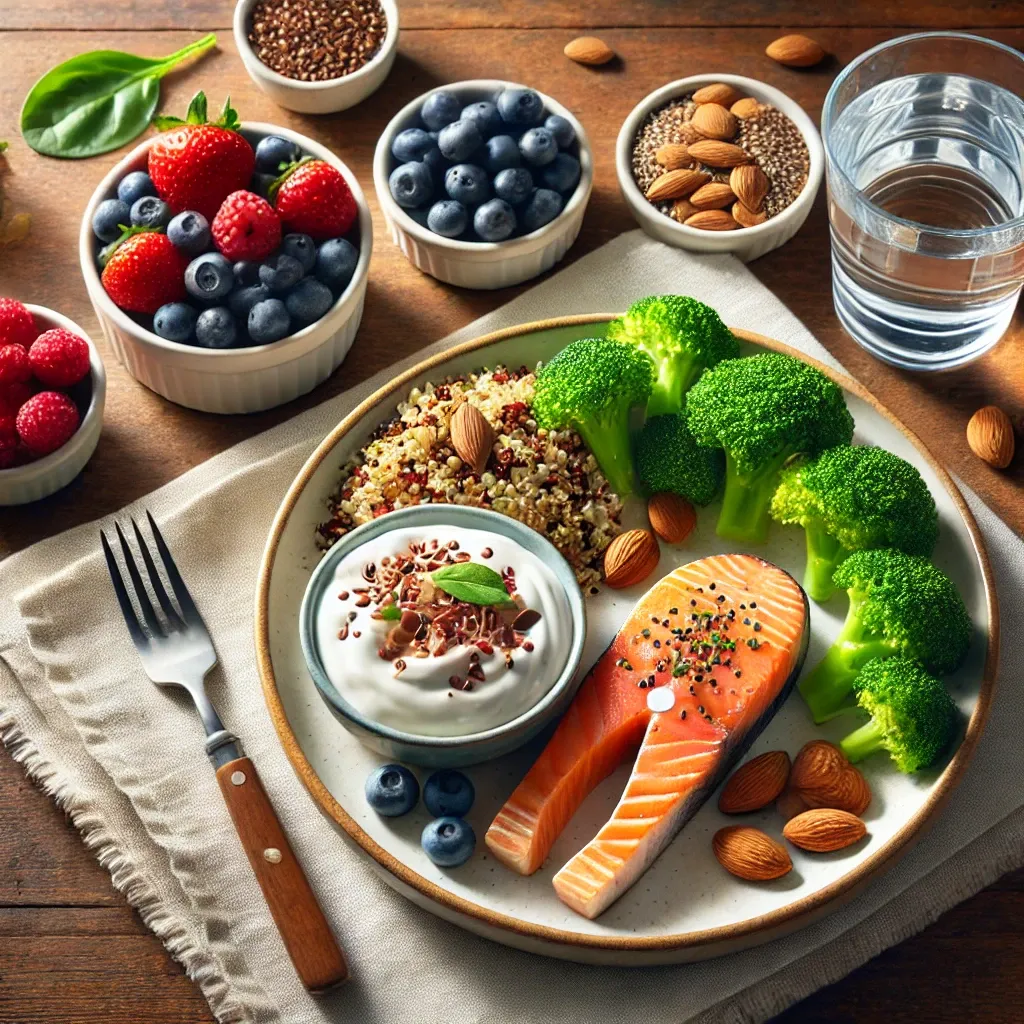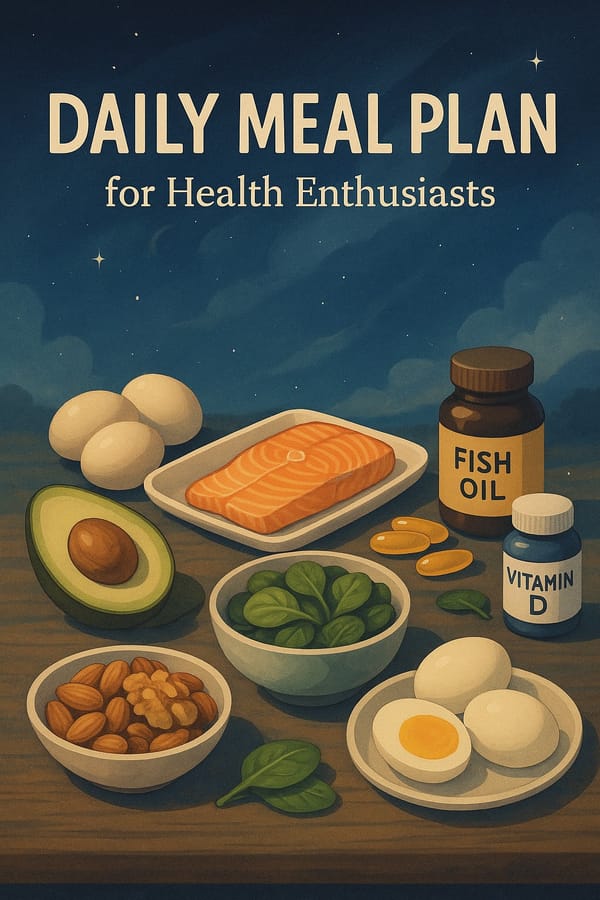5 Foods That Boost Brain Health for Individuals Aged 50+
Discover five science-backed foods that support brain health for those aged 50 and older. Learn how nutrients like omega-3 fatty acids, antioxidants, and probiotics help maintain memory, cognition, and overall mental well-being.

Introduction
As we enter our 50s and beyond, the body undergoes changes that can impact various systems—including the brain and nervous system. Memory, learning, and critical thinking might not feel as sharp as they once did. However, caring for your brain can be simpler than you think if you have the right information. Choosing foods that provide essential nutrients like B vitamins, healthy fats, and antioxidants can help keep your brain functioning well for the long term.
In this article, we will discuss five key foods supported by scientific research that can help maintain and enhance cognitive function for individuals aged 50+. In addition, we will provide tips on meal planning and share ways to develop healthy eating habits for long-term brain wellness.
1. Fatty Fish Rich in Omega-3 Fatty Acids
Why Are Omega-3s Important for the Brain?
Fatty fish—such as salmon, sardines, tuna, and mackerel—are often referred to as “brain foods” due to their high content of omega-3 fatty acids, particularly DHA (Docosahexaenoic Acid). DHA is a key component in the formation of brain cell membranes and helps facilitate effective communication between neurons.
Scientific Evidence: A study published in the Journal of Alzheimer’s Disease revealed that individuals who regularly consume omega-3-rich fish tend to have better memory and cognitive processing, as well as a reduced risk of developing dementia.
Recommended Intake
- Frequency: Aim to include fatty fish in your diet at least 2–3 times per week. Alternatively, you may consider taking fish oil (omega-3) supplements, under the guidance of your healthcare provider.
- Cooking Methods: Opt for baking, grilling, or steaming over frying to reduce unnecessary fat.
- Safety Note: If you have high cholesterol or liver problems, consult a doctor before starting fish oil supplements.
2. Whole Grains
The Role of Complex Carbohydrates in Brain Function
Whole grains, such as brown rice, oats, and whole wheat bread, provide complex carbohydrates that release glucose into the bloodstream gradually. This is crucial for providing the brain with a steady supply of energy, unlike simple carbohydrates that may cause rapid spikes and drops in blood sugar levels.
Scientific Evidence: Research published in the American Journal of Clinical Nutrition found that regular consumption of whole grains may help reduce the risk of type 2 diabetes—a condition that can be associated with memory and cognitive issues in older adults.
Tips for Eating Whole Grains
- Choose Brown Rice Over White Rice: This helps stabilize blood sugar levels and also provides additional B vitamins and dietary fiber.
- Vary Your Options: Incorporate oats, whole wheat bread, or quinoa to get a wide range of nutrients.
- Practical Tip: Mix different varieties of brown rice—like red, jasmine, or black—to add more color and nutrients to your meals.
3. Berries and Dark Green Leafy Vegetables
Antioxidants for Brain Health
Berries (strawberries, blueberries, raspberries) and dark green leafy vegetables (spinach, kale, broccoli) are loaded with antioxidants and flavonoids. These compounds help reduce inflammation in the brain and protect neurons from age-related decline.
Scientific Evidence: A study featured in Annals of Neurology showed that older adults who regularly consumed berries experienced a slower rate of cognitive decline, including memory and processing speed.
How to Incorporate Them Daily
- Power Up Your Breakfast: Add berries to yogurt, plant-based milk, or smoothies.
- Include Veggies in Every Meal: Throw spinach or kale into soups, or steam them to enjoy with your favorite dip.
- Colorful Plate: The more colors on your plate, the wider the range of nutrients you’ll receive.
4. Nuts and Seeds
Protein, Healthy Fats, and Phytonutrients
Nuts and seeds—such as almonds, walnuts, chia seeds, flaxseeds, and pumpkin seeds—are packed with protein, good fats, and phytonutrients that benefit brain health. They help sustain energy levels and keep blood sugar in check.
Scientific Evidence: The British Journal of Nutrition reports that regular nut consumption may help enhance memory and learning capabilities. Good fats in nuts positively impact communication between brain cells.
Making the Most of Nuts and Seeds
- Healthy Snack: Choose unsalted, raw, or lightly roasted varieties to avoid excessive salt or sugar.
- Topping for Salads: Add a crunchy texture and extra nutrition by sprinkling nuts or seeds on your greens.
- Mind Your Portions: While healthy, nuts and seeds are calorically dense, so moderation is key.
5. Yogurt and Fermented Dairy Products (Probiotics)
Gut-Friendly Microorganisms for the Brain
Numerous studies suggest that gut health significantly impacts brain health. Beneficial gut bacteria can aid in the production of neurotransmitters like serotonin and dopamine, which play essential roles in mood regulation and cognitive function.
Scientific Evidence: According to research in Frontiers in Aging Neuroscience, the gut-brain axis is a complex system, but maintaining balanced gut flora may help reduce the risk of age-related neurological issues.
How to Include Probiotics in Your Diet
- Yogurt and Greek Yogurt: Choose low-fat, low-sugar options to better control overall calorie intake.
- Combine with Fruits or Whole Grains: Enhance nutrient density by mixing yogurt with berries or grains.
- Other Sources: Kefir, sauerkraut, and kimchi also serve as excellent sources of probiotics.
Additional Tips for Maintaining Brain Health
1. Regular Exercise
Activities such as brisk walking, swimming, yoga, or tai chi increase blood flow to the brain and can even stimulate the growth of new brain cells in certain regions. Physical activity also plays a role in stress management.
2. Meditation and Relaxation Techniques
Deep breathing, mindfulness exercises, or meditation sessions can improve focus and reduce stress—both vital elements for slowing cognitive decline.
3. Adequate Sleep
Sleep is a period when the brain undergoes crucial repair and restoration. Lack of quality sleep can affect memory, decision-making, and mood regulation.
4. Mental Stimulation
Engaging in activities that challenge the brain—like reading, puzzle-solving, jigsaw puzzles, or learning new skills (languages, musical instruments, or arts)—helps keep your mind sharp.
Conclusion
Once you pass the 50-year mark, maintaining healthy brain function is crucial for preserving your quality of life. Incorporating foods rich in omega-3 fatty acids from fish, whole grains, antioxidant-packed fruits and vegetables, nuts and seeds with healthy fats, and probiotic-rich dairy products can help keep your mind sharp. Alongside a balanced diet, regular exercise, proper sleep, stress management, and cognitive exercises are all integral to overall brain health.
Remember, nutrition is only one aspect of a comprehensive plan for cognitive wellness. By combining the right food choices with positive lifestyle habits, you can continue to enjoy mental clarity, alertness, and vitality well into your 50s and beyond.
Disclaimer: This article provides general nutritional information and should not replace personalized medical advice. If you have underlying health conditions or specific dietary concerns, consult a qualified healthcare professional before making significant changes to your eating habits.



